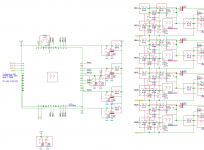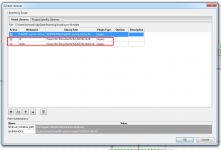As far as I understood is sudermap applying an external voltage instead of connection a plain potentiometer.
Raphael
I'm using a digital potentiometer (MAX5481), which acts closer to a pot than a voltage source (though I had previously been playing with a 12 bit ADC). I'll be on Discord later this afternoon (in 2-3 hours) if you need any specifics to try and replicate the issue.
In regards to anyone worried about performance issues, definitely the encoder input is the most reliable at the moment (though I'd stress the normal potentiometer input isn't a huge difference). I'd use the encoder if I didn't have other circuitry that needed to track the volume setting, it was simply easier for my use case to plow through the issues than switch control methods.
I'm assuming it would need to be an incremental encoder due to there being only 2 wires (ROTI/ROTQ) for position, what is the required pulses per revolution? Is that programmable and dependent only on user preference? Any recommendations for a specific unit?Well the easy solution is to use the rotary encoder for volume control. Both control actually the same volume block. It is just a matter of which component you prefer. The rotary encoder does not have the voltage issue.
Raphael
EDIT: Yeesh, they are not cheap (name-brand ones, anyway).
EDIT2: What is provided by a rotary encoder that avoids the same issue with spurious output around any given position crossing? Does a rotary encoder have a slight amount of built-in hysteresis (?) to prevent unintended position changes?
Last edited:
EDIT2: What is provided by a rotary encoder that avoids the same issue with spurious output around any given position crossing? Does a rotary encoder have a slight amount of built-in hysteresis (?) to prevent unintended position changes?
Rotary encoders are digital (increment, decrement, or nothing) and thus do not have any sort of "position crossing" by definition. How would you ever be in a state where you were "between" positions for a digital signal?
Yeesh, they are not cheap (name-brand ones, anyway)
I'm not sure which encoders you're looking at, but they should be much less expensive than any decent audio potentiometer. I can find hundreds of different incremental encoders for around $1.5 USD or less on DigiKey. As far as pulses per revolution, just get whatever you want. Other than personal preference for feel there's no difference, an encoder is an encoder is an encoder.
Last edited:
An encoder still has to internally convert its shaft position to its output. If there are no mechanical detents (I have no idea) for where each pulse "hits" then it's pretty easy to imagine a way to end up with a bit of jiggle between each position.Rotary encoders are digital (increment, decrement, or nothing) and thus do not have any sort of "position crossing" by definition. How would you ever be in a state where you were "between" positions for a digital signal?
Weird, the cheapest one I found on Digikey was like $30. Maybe it was because I filtered out anything that couldn't handle 12 VDC. Was that unnecessary?I'm not sure which encoders you're looking at, but they should be much less expensive than any decent audio potentiometer. I can find hundreds of different incremental encoders for around $1.5 USD or less on DigiKey. As far as pulses per revolution, just get whatever you want. Other than personal preference for feel there's no difference, an encoder is an encoder is an encoder.
EDIT: I'm not sure if this helps or hurts my position: Rotary Encoder - How to debounce them for absolute accuracy.
Last edited:
An encoder still has to internally convert its shaft position to its output. If there are no mechanical detents (I have no idea) for where each pulse "hits" then it's pretty easy to imagine a way to end up with a bit of jiggle between each position.
Weird, the cheapest one I found on Digikey was like $30. Maybe it was because I filtered out anything that couldn't handle 12 VDC. Was that unnecessary?
EDIT: I'm not sure if this helps or hurts my position: Rotary Encoder - How to debounce them for absolute accuracy.
Vcc is 3.3v, it's tied to the ESP-32 micro-controller.
Debounce is only relevant while the encoder is being turned, it doesn't affect anything in steady state. An analog solution on the other hand has some amount of noise (which can make the aforementioned quantization noise modulation) that is always present.
Ah, OK, I saw "Vd" in the manual and just assumed it was the external supply voltage.Vcc is 3.3v, it's tied to the ESP-32 micro-controller.
The docs for the encoder mentioned in the manual and the schematic show it's a bog-standard IQ encoder, so anything of the sort from Mouser or Digikey should do the trick so long as it'll take 3.3 volts for Vcc. Mouser has a whole passel of them, just remember to tick the "In Stock" box before a search 
You might have to mess around with pullup resistors and hooking one side of the switch to ground or Vcc [1] but that's not the end of the world.
[1] I don't know which so it will be a Voyage Of Discovery
You might have to mess around with pullup resistors and hooking one side of the switch to ground or Vcc [1] but that's not the end of the world.
[1] I don't know which so it will be a Voyage Of Discovery
Last edited:
Are the conductive parts (gold/copper?) of the mounting holes isolated from "GND"?
Are there any details available for the onboard voltage regulation/filtering? I have not been able to find a copy of the schematic on github. Got my Aurora in the mail today and can't identify any of the chips that I think might be involved on the power side of things.
Are there any details available for the onboard voltage regulation/filtering? I have not been able to find a copy of the schematic on github. Got my Aurora in the mail today and can't identify any of the chips that I think might be involved on the power side of things.
Last edited:
Once more for all: Please download the latest commit from the master branch of freeDSP-aurora on GitHub. There you will find the full documentation including schematics and pcb layout. You just need to get a copy of KiCAD. Its free! Then, looking at the schematic and the PCB layout will answer all these questions. 
How many pulses per revolution should the encoder have? If I get one with too few then I'll be forever turning the knob to get a small volume change, and one with too many will have me picking tweeters from my teeth.
EDIT: after extensive Google-fu, it seems the KY-040 has 20 pulses per revolution so encoders with 16 to 32 ppr should do the trick.
EDIT: after extensive Google-fu, it seems the KY-040 has 20 pulses per revolution so encoders with 16 to 32 ppr should do the trick.
Last edited:
Another question... does the Aurora have the ability to stream multiple channels of digital audio via USB output? For example, where an 8-channel DAC (e.g. Okto dac8 PRO) might be desired after the Aurora handles the DSP for the 8 channels?
Also, is there another forum with more activity on this product?
Also, is there another forum with more activity on this product?
Last edited:
- Home
- Source & Line
- Digital Line Level
- freeDSP-aurora - DSP with 8 I/Os, USB Audio, S/P-DIF, ADAT, Bluetooth and Wifi contro

